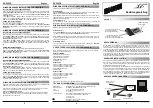
11
4.
User Name
5.
MAC Address of all NICs (Network interface card) connected to the host
6.
dentify versions of all Driver DLLs and Libraries used (NDIS) and optionally
7.
HomePlug chipset manufacturer name (Turbo Only devices)
8.
MAC Firmware Version (Turbo Only devices)
9.
MAC addresses of all devices connected locally to the host
10.
Version of the Configuration Utility
11.
Vendor name
The Lower panel contains a history of all remote PA-1108 devices seen on the
computer over a certain period of time. All PA-1108 devices that were on the
powerline network are listed here. Devices that are active on the current logical
network will show a transfer rate in the Rate column; devices on other networks, or
devices that may no longer exist are shown with a “?” in the Rate column. The
following remote device information is available from the diagnostics screen:
1.
Device Alias Name
2.
Device MAC Address
3.
Device Password
4.
Device Last known rate
5.
Device Last Known Network name
6.
HomePlug chipset manufacturer name
7.
Date device last seen on the network
8.
MAC Firmware Version. (Turbo Only)
The diagnostics information displayed may be saved to a text file for later use, or can
be printed for reference for a technical support call. Devices, which are not part of the
network anymore, can be deleted using the delete button. A dialog window pops up
with a confirmation message if we try to delete a device whose password has been
entered.






























